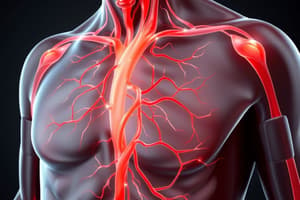Podcast
Questions and Answers
What is the primary function of erythropoietin in erythropoiesis?
What is the primary function of erythropoietin in erythropoiesis?
- To stimulate the production of red blood cells (correct)
- To aid in the transport of oxygen
- To promote the formation of plasma proteins
- To inhibit the production of white blood cells
Which of the following components makes up approximately 55% of blood?
Which of the following components makes up approximately 55% of blood?
- Platelets
- White blood cells
- Blood plasma (correct)
- Red blood cells
What is the normal range for systolic blood pressure in humans?
What is the normal range for systolic blood pressure in humans?
- 120–140 mm Hg
- 130–110 mm Hg (correct)
- 140–160 mm Hg
- 110–130 mm Hg
What characterizes hypertension according to the provided information?
What characterizes hypertension according to the provided information?
Which process primarily facilitates capillary exchange of substances?
Which process primarily facilitates capillary exchange of substances?
What role do plasma proteins play in the blood?
What role do plasma proteins play in the blood?
What is systolic pressure?
What is systolic pressure?
Which nutrient is NOT essential for red blood cell production?
Which nutrient is NOT essential for red blood cell production?
Flashcards are hidden until you start studying
Study Notes
Cardiovascular Physiology: Vascular System
- The cardiovascular system is made up of the heart, blood vessels, and blood.
- Systolic pressure is the pressure created when the ventricles contract.
- Diastolic pressure is the pressure created by the recoil of the aorta and closure of the aortic semilunar valve.
- Capillary Exchange involves the velocity of blood flow, the cross-sectional area of capillaries, and exchange processes like diffusion and transcytosis.
- Pressure gradients drive filtration and colloid osmotic pressure in the capillaries.
- Some capillaries have gaps (intercellular clefts) where the plasma membrane is not joined by tight junctions.
- Some capillaries also have fenestrations (pores).
Mean Arterial Pressure (MAP)
- MAP is influenced by local, hormonal, renal, and neural controls.
Variations in Blood Pressure
- The normal range for human blood pressure is variable.
- Normal blood pressure is 130–110 mm Hg systolic and 80–75 mm Hg diastolic.
- Hypotension is low systolic blood pressure (below 110 mm Hg), and is often associated with illness.
- Hypertension is high systolic blood pressure (above 140 mm HG) and can be dangerous if chronic.
Cardiovascular Physiology: Blood & Hemostasis
- Blood has three main functions: transportation, regulation, and protection.
- Blood is made up of plasma and blood cells.
- Blood cells consist of red blood cells, white blood cells, and platelets.
Blood Plasma
- Plasma is composed of water (91-92%), plasma proteins (7-8%), and other components like ions, sugars, lipids, amino acids, and vitamins (1-2%).
- Albumin, globulin, and fibrinogen are the main types of plasma proteins.
Pluripotent Stem Cells
- Pluripotent stem cells are responsible for producing all types of blood cells.
Red Blood Cells
- Red blood cells are 7 µm in size and have a biconcave disc shape.
- They are anucleated, lack organelles, and cannot reproduce.
- They contain hemoglobin, a protein that binds to oxygen.
- Their plasma membrane has specific glycolipids.
- Red blood cells are produced in the bone marrow.
Erythropoiesis
- Erythropoiesis is the production of red blood cells.
- It requires iron, folic acid, and vitamin B12.
- Iron is a key element in hemoglobin's binding to oxygen and is stored as ferritin in the liver.
- Folic acid is required for thymine synthesis, important in DNA formation and cell division.
- Vitamin B12 is needed for folic acid function and requires intrinsic factor for absorption.
- Erythropoiesis is regulated by erythropoietin, a hormone secreted by the kidneys.
Studying That Suits You
Use AI to generate personalized quizzes and flashcards to suit your learning preferences.




